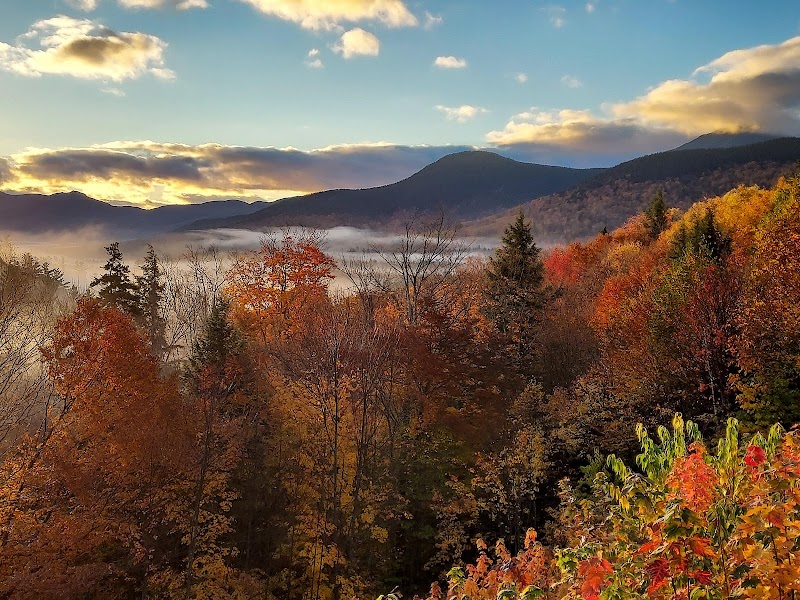
Planning Your Adventure to Lost River Gorge and Boulder Caves in Woodstock, NH
Encounter the exhilarating terrain of Lost River Gorge and Boulder Caves in Woodstock, New Hampshire. This compact but thrilling hike offers close-up encounters with rushing streams and ancient boulders—perfect for those seeking a practical yet vibrant outdoor adventure.
Adventure Tips
Wear traction-focused footwear
The trail includes slippery boulder caves and damp boardwalks; shoes with solid grip are necessary to navigate safely.
Bring adequate water
Keep hydrated—there’s limited access to potable water along the trail, and exertion can quickly deplete your reserves.
Plan for cooler conditions inside caves
Temperatures drop noticeably in shaded and cave areas, even on warm days—pack an extra layer for comfort.
Start early to avoid crowds
Weekends and midday hours can get busy; early mornings offer quieter trails and better photo opportunities.
Planning Your Adventure to Lost River Gorge and Boulder Caves in Woodstock, NH
Woodstock, New Hampshire, offers a rugged playground that invites you to engage head-on with nature’s raw architecture. Among its most compelling draws is Lost River Gorge and Boulder Caves—a stretch of forest where earth and water collide in narrow passages, tumbling currents, and imposing boulder formations that dare your every step.
The hike through Lost River Gorge is approximately 1.1 miles roundtrip, with an elevation gain of about 300 feet. Its terrain is a mix of dirt paths, wooden boardwalks, and scrambling over slippery granite boulders inside caves formed by glacial forces. The pathway winds through thick stands of spruce and maple, their branches playing with dappled sunlight, while the river itself pushes forward with restless energy below and alongside you. The soundscape is dominated by rushing streams and the occasional scraping stone.
This journey doesn’t require expert skills, but a comfortable pair of sturdy hiking shoes with good grip is essential. The boardwalks help navigate wet or uneven ground, but cave passages demand flexible movement and a willingness to crouch or climb. Bring water and pace yourself—stream crossings and climbs are frequent, and the cool mist from the rapids can mask fatigue.
Timing your visit is practical and strategic. Spring and early summer bring swollen streams and vibrant greenery, while fall showcases a riot of reds and yellows against the grey rock. Winter’s ice adds a different challenge but closes the trail to casual visitors.
The Gorge’s personality demands respect—not just from the physical exertion but in how you interact with the environment. Slippery rocks could abruptly end your adventure if overlooked. Wildlife here watches quietly from cover: expect the occasional deer silhouette or the dart of a chipmunk amid leaves.
Your reward is tangible in the texture of moss on boulders, the swirl of cold currents teasing your fingers, and the occasional glimpse through narrow cave crevices to a sky that feels wider than elsewhere. Lost River Gorge and Boulder Caves offer an intimate dance with nature that tests both your body and senses.
Before you set out, check local weather, pack layers for quick temperature changes, and arrive early to avoid crowds. This hike is a concentrated dose of New Hampshire’s natural forces, ready to challenge, inspire, and refresh every adventurer who passes through.
Nearby Trips
All Adventures
Boat Charters
Water Activities
Adventures near Lincoln, New Hampshire
Discover the unique and memorable adventures that make Lincoln, New Hampshire special.
Frequently Asked Questions
Are dogs allowed on the Lost River Gorge trail?
Dogs are permitted on-leash, but be aware that the trail’s rocky and narrow cave sections might challenge some dogs. Bring water and watch for slippery spots to keep your pet safe.
Is the trail accessible for young children or older adults?
While the overall distance is manageable, sections inside the boulder caves require climbing and crouching which might be difficult for very young children or those with limited mobility.
Can I hike Lost River Gorge in winter?
The main trail often closes during winter due to ice hazards. Experienced winter hikers with proper gear may explore at their own risk, but it’s not recommended for casual visitors.
Are there any guided tours available?
Yes, guided tours run seasonally and provide insight on the geology, local flora, and fauna, adding context to the physical experience.
What wildlife might I encounter on the trail?
Look for white-tailed deer along quieter stretches, chipmunks darting under leaves, and a variety of songbirds active in the canopy.
Is photography allowed in the caves?
Absolutely, but bring a camera that can handle low-light conditions or use a headlamp to illuminate key rock formations without disturbing the natural setting.
Recommended Gear
Hiking shoes with grip
Non-slip soles prevent falls on wet rocks and inside boulder caves, ensuring safe passage.
Water bottle or hydration pack
Maintained hydration is key in an active, physically demanding hike with no water sources on route.
Layered clothing
Variable temperatures inside caves and around shaded forest require flexible clothing options.
Small backpack
Useful to carry water, snacks, and an extra layer without cumbersome bulk.
Local Insights
Hidden Gems
- "Hidden stone viewpoints offering quiet, sweeping shots over the gorge’s forest canopy"
- "A secret small waterfall just off the main trail with fewer visitors"
Wildlife
- "White-tailed deer"
- "Eastern chipmunks"
- "Pileated woodpeckers"
History
"Lost River Gorge was formed by the last glacial period, carving its boulder caves from massive granite slabs. It was developed as a public park in the mid-20th century, preserving its wild character while allowing safe public access."
